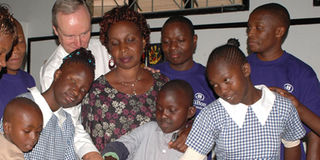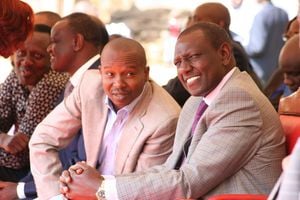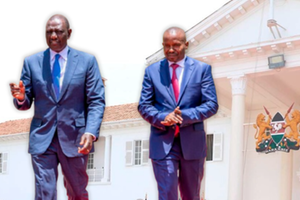Where deaf and dumb children enjoy learning

Pupils at the school are assisted to cut a cake that was donated by a local hotel, which also sponsors the school. Photo/JOSEPH MATHENGE
When Louise Ouko arrived at Kilimani unit for the deaf and blind, she was a withdrawn child.
And because she was both deaf and blind, she had no way of communicating either with her teacher, Mrs Jane Ramu, or the 17 other pupils at the unit which is part of Kilimani primary school in Nairobi.
“She would just sit there alone. She looked isolated and did not even have any hair on her head,” says Mrs Ramu. But after two years of constant coaching, all that has changed.
“Now, she can tell you what she wants. If she wants to go shopping, she’ll tell me she wants to go to Yaya. She’s writing Braille. She even knows how to ride a bike,” says Ramu.
Teaching Louise to write and communicate has not been an easy task. Mrs Ramu had to start slowly. She introduced Louise to different objects by placing them in the child’s hand to touch.
She would then use sign language to explain what the objects were by writing their names inside Ouko’s palm. Two years later, the changes in the young girl are dramatic and she can now live a fuller and more enjoyable life.
However, nurturing the kind of growth now evident in Louise’s life is not easy, says Mr Geoffrey Atieli, the director of Sense International East Africa, a charity organisation that provides expert advice and specialist services for children and adults who are both deaf and blind.
“We are trying to connect the deaf and blind children with their families. It’s a process that takes years. The transformation does not happen immediately,” says Mr Atieli.
And success comes at a cost. The school, which is Government-run, receives about Sh4,000 for every child with special needs every year, compared to Sh1,200 for each child in public primary schools.
Still, the money is not enough. The costs required to run such a unique environment leaves Kilimani with no choice but to rely heavily on grants from well-wishers who sponsor some of its programmes.
“We are able to reimburse students for their transport costs to and from school every day. It has raised attendance rate from 30 per cent to 97 per cent. But if we had to pull out for any reason, the numbers would drop again,” says Mr Atieli.
Fully functional
He and Mrs Ramu are convinced that with proper educational support, deaf and blind children can play a useful role in society once they grow up.
The students, although challenged in some ways, are fully functional in others and have the potential to lead fulfilling lives.
It’s just a matter of finding the right fit, something that can be done through adequate care and educational attention from a tender age.
That knowledge of the children’s needs explains why Mrs Ramu has become like a second mother to many of her students. Not only does she teach them at school, but some of them live in her house as well.
“It started on a whim really,” she says. According to her, the mother of one of her pupils had died and the rest of his family kept him locked up in a room that they hardly ever cleaned.
Completely dark
“When we found him, it was completely dark inside,” she says. Ramu took it upon herself to rescue the boy and bring him into her own family — which already comprised her husband and their three children.
With time, six more special children became part of her growing family, living with her and attending her classes. Among the new members are two children who were displaced during the post-election violence earlier this year.
A third still bears a scar on his face. The five-year old was injured when his frustrated father, not knowing what else to do with the child, decided to burn him.
At the school, Mrs Ramu is the children’s guiding light and a literal beacon of hope. The children take her hand without question when she reaches out to them or when she calls them by name for those who have a little hearing ability.
They follow her and trust her and she is happy to teach them. Still, she admits that there is only so much that one person can do. For example, the classrooms have to be modified to suit the needs of the children.
“It gets expensive and we can’t ask parents to supply these things. They can’t afford it,” she says.
Ideally at a school like hers, the teacher-student ratio should be one to one. But at Kilimani, the ratio is one teacher for every seven students.
Many teachers rarely stay at the school longer than a year or two. The biggest complaint has been that they were discouraged, having few learning aids for the class and too many students which made it difficult for them to offer individual attention to each of the special children.
But Mrs Ramu is still soldiering on, four years after arriving at the school. On any given day, she takes each of her students to a quiet room filled with different objects, including rubber, musical instruments and household items like a mop and carpet.
Here, she guides the hand of the students to touch each object stuck on the wall. And from feeling the texture and shape of the objects, the students can then learn what each one of the item represents.
There are no lamps in the room. Instead, Mrs Ramu relies on a black light. It is the only guide to “illuminating” the different bits and pieces placed strategically on each wall around the room.
The goal is for each student to be able to recognise and identify each item merely by touching it. “Even though their vision is limited, the black light provides a contrast for the children’s eyes.
It allows them to focus their remaining senses and draw their attention to what I want them to touch,” she says.
The work done by teachers and administrative staff at the Kilimani school offers more than just a helping hand to some of Kenya’s most vulnerable children.
Mr Atieli says the Government can play a bigger role in providing funding and other resources, including teachers, to help improve the quality of education in this and other schools like it.




